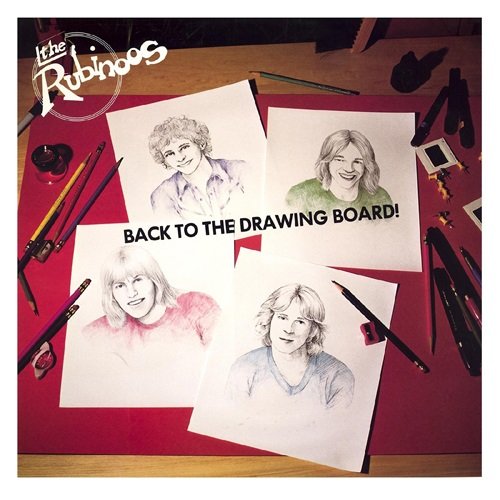An American power pop band whose undying love for hooks and harmonies is wed to a sly wit that's never far from the surface, the Rubinoos are widely regarded as one of the best and smartest acts to come from the 1970s pop scene. Like the Raspberries and Pezband, the Rubinoos write and perform songs that affectionately honor the mix of irresistible melodies and spunky guitars pioneered by the Beatles and bubblegum, and 1977's The Rubinoos and 1979's Back to the Drawing Board are hook-filled, crafted with care, and brimming with rambunctious humor. 1998's Paleophonic and 2019's From Home showed the band never lost the magic of their first era, even as they matured.
The Rubinoos were formed by Tommy Dunbar (guitar, keyboards, and vocals) and Jon Rubin (lead vocals, rhythm guitar), who would be the band's leaders and constant members throughout their history. The first incarnation of the group debuted in 1971, when Dunbar and Rubin put together a band with their friends to play a dance at their high school in Berkeley, California. The set was dominated by oldies of the '50s and '60s and was the first manifestation of their fascination with vintage pop sounds. Dunbar and Rubin soon formed a more stable edition of the band that focused on original material, with Dunbar and Rubin joined by bassist Tom Carpender and drummer Donn Spindt. As it happened, Dunbar's brother Robbie Dunbar was a member of the band Earth Quake, an established act signed to A&M Records, and the Rubinoos became their little brother band, often opening their shows and learning the ropes of the musician's life. When Earth Quake's deal with A&M came to an end, the group's manager, Matthew "King" Kaufman, decided to form his own label, thinking the band would be better served working with a small company, and he began recruiting talent for the nascent Beserkley Records. The Rubinoos were given the nod, and their debut single, "Gorilla" was recorded in September 1974. By the time it was released, Tom Carpender had left the group, and Greg "Curly" Keranen took over on bass. The single would later appear on the Beserkley sampler album Beserkley Chartbusters, Vol. One, which also featured two tracks from Jonathan Richman with the Rubinoos serving as his backing band. By 1976, Keranen was out of the band, having opted to join Jonathan Richman's Modern Lovers, and Royse Ader signed on as bassist in time for the recording of the Rubinoos' first album.
The Rubinoos was released in 1977 and earned enthusiastic reviews from the rock press; it also included a cover of Tommy James and the Shondells' "I Think We're Alone Now," which became a hit, rising to number 45 on the American singles chart and earning the band an appearance on American Bandstand. 1979 saw the release of the second Rubinoos album, Back to the Drawing Board, which included the single "I Wanna Be Your Boyfriend," which enjoyed plenty of airplay in England and Europe. Once again, the album was a hit with critics, and the band supported the release with plenty of touring, including a long run of dates opening for Elvis Costello as his album Armed Forces was becoming a breakthrough hit. In 1980, Royse Ader left the group, and Al Chan took over on bass as the band started work on a third album. However, the project never got past the demo stage, and it was abandoned after Al Chan and Donn Spindt dropped out. Dunbar and Rubin continued as the Rubinoos, and they landed a new record deal with Warner Bros. The 1983 EP Party of Two was produced by Todd Rundgren, with members of his band Utopia helping fill out the personnel in the studio, giving the songs a glossier, synth pop-influenced sound. One of the tracks, "If I Had You Back," was in rotation on MTV, and its success led to the Rubinoos being invited to write two songs for the soundtrack to the film Revenge of the Nerds, "Breakdown" and the title tune.
In 1985, the Rubinoos went on hiatus, though Dunbar and Rubin always insisted the group never broke up. Dunbar teamed with Al Chan and Donn Spindt to form a band called Vox Pop, and Rubin sang with a doo wop group, the Mighty Echoes. In 1994, two collections of unreleased Rubinoos material were released, Garage Sale and Basement Tapes: Studio Demos Circa 1980-1981, the latter featuring the demos for the abandoned third album. The collections helped stoke new interest in the group, and in 1998, they released a long-gestating comeback album, Paleophonic, which reunited Dunbar and Rubin with Al Chan and Donn Spindt. From this point on, Dunbar and Rubin would periodically reconvene the Rubinoos with Chan and Spindt for touring and recording when they felt so inclined. They cut an album of covers, Crimes Against Music, in 2002, and a tour of Japan from that year was documented on Live in Japan, issued in 2004. A new studio project, Twist Pop Sin, was issued by Air Mail Music in 2005, and in 2007 they were in the news when they filed suit against pop star Avril Lavigne, claiming her hit "Girlfriend" plagiarized "I Wanna Be Your Boyfriend." The matter was settled out of court.
In 2010, they delivered their first children's album, Biff-Bop-Boing! The same year, they also issued an album for their more mature followers, Automatic Toaster, produced by fellow power pop hero Robbie Rist. The Rubinoos signed with the noted independent label Yep Roc Records for 2019's From Home, which was produced by singer/songwriter and longtime fan Chuck Prophet. The CBS Tapes was a 2021 release that gave the first public presentation to a 1976 live-in-the studio session the band recorded as they were getting accustomed to the studio where they were about to cut their debut album.




